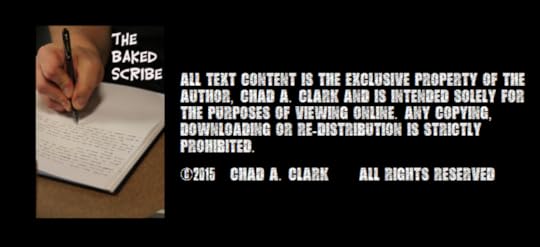Ramblings On The Craft : Write What You Know?

DISCLAIMER : I consider myself to be a life-long writer but I am still an aspiring author. What’s the difference? Essentially, to me anyway, it means that while I have devoted a great deal of time to my words and my art, the amount of money I have made as a professional writer to date could maybe be used to purchase a nice steak dinner for two. So while I have a deep and devoted passion for writing, I do not claim in any way to be an expert or authority figure. What you will find in these essays represent my personal thoughts and feelings about various issues related to writing. I think that in any endeavor, it is essential to have the mindset that there is always something to learn, something you don’t know. As soon as you start to think that you are an authority on anything (besides how to eat a hot dog or perhaps, spelling your name) there might be a problem. With that in mind, I am fully cognizant and comfortable with the fact that on any and all of these issues, I could be completely wrong.
Put another way, I recognize and admit that I could be full of shit.
.
.
In the grand pantheon of generic advice given to writers, both from those who know what they are talking about, and those who don’t, this is one that we hear a lot. Likely, we have heard from a very early age, whether it be in writers workshops or in school classrooms. I can vividly remember hearing it from various grade school teachers, whenever we would get to a unit on creative writing. Write what you know, they said. Write what you know because you will be able to present something that is believable and authentic. You will be able to write something that is correct, because you clearly will know what you are talking about.
And I can’t say that I completely fault anyone for taking this approach, or in seeing the wisdom in advising other writers to do the same. On the surface, this seems very intuitive. If you try and write about something that you have no personal knowledge or experience with, then how can you possibly write something that is going to be legitimately accepted by your readers?
Here’s where I have problems with the advice and, ultimately why I don’t pay much attention to it. Telling someone to write what they know if fine, if you happen to be writing literary fiction. It’s easy to say, “write what you know”, because chances are, your life experiences are easier to translate into whatever it is you happen to be writing. If you are writing about someone who grows up with abuse in their childhood, or someone who is dealing with the ravages of drug addictions, or is a victim of domestic abuse, or overcomes a learning disability to get accepted into Harvard, those stories are definitely going to be enhanced if the author themselves has had personal experience, and are bringing that to the table.
But even in those circumstances, I would never tell someone that they weren’t allowed to write about spousal abuse or alcohol addiction, if they have never experienced it themselves. If those subjects are something that you are passionate about, there are certainly avenues for you to learn more about it, even if you haven’t lived it. Besides the obvious resource of libraries and biographies, there are bound to be plenty of websites and blogs from victims, who are more than willing to share their personal experiences. These are all things that you can use to lend an authentic voice to your writing.
The problem becomes confounded even , when we consider anyone who might have an interest in writing about the fantastical, about the magic and spectacle they see, only in their imaginations. It’s not like you could ever have real experience with traveling to alien worlds. You’re never going to know if there actually is an afterlife or what that might me like. Ultimately, there are just some aspects of fiction and some stories that are always going to be speculative and to suggest that not having personal knowledge of something should prohibit you from writing about it would eliminate a great deal of amazing books and stories. Where would Dune fall into the realm of, “write what you know”? Or 2001? Or Dune? I, Robot? The Lord Of The Rings? The War Of The Worlds?
The list would go on forever, and I think our literary landscape would be quite a bit more dull, if that rule were to actually reign supreme over the land. For me, as a horror writer, that rule would pretty much take everything off the table for me. Even as a kid in grade school, I always wanted to ask the teachers, aren’t writers supposed to exercise their imaginations? Isn’t the heart of any fictional writing at least somewhat based in fantasy?
And that isn’t to say that as a writer you shouldn’t make every effort to educate yourself about whatever random subject or piece of information comes your way. Just keep in mind that you could end up with some bizarre Google search histories if you aren’t paying attention. I don’t want it to sound like I think that because we are writing in the realm of make-believe, that the author is relieved of any obligation to make the effort on the research side of things. The Internet has made a writer’s life quite a bit easier anymore. Do you want to write a story set in Cairo? You can actually use Google Maps to go there, or at least enough to lend some extra credibility to your story. Want to write a story with a main character who is a surgeon? Look up information on surgical procedures, to give you a small arsenal of jargon and knowledge that make your character seem credible. Your readers aren’t going to expect you to get it perfectly right. Ask a nurse someday about how many times on ER, one of the “doctors” was shown using a piece of equipment in a way that wasn’t even close to being right. As long as the story is good, and you make a reasonable effort, it will work. We still have to do our due diligence as writers, but the point is that we don’t have to exclude anything just because we don’t have experience with it ourselves.
In my mind, I see the solution to this issue as a hybrid, a landing zone somewhere in between the two extremes. You shouldn’t be so limiting in what you are choosing to write about, but you should also want your books to be accurate and real. For me, when I say, write what you know, what that means is to take your own background, and skill sets, and make them a part of your story somehow. We all have various subjects that we are experts on. Let that be a touchstone for your story. Use your own perspective to give your characters a unique voice in some areas, in a way that only you could have created. Just as an example to demonstrate this, I suspect that it is no coincidence that so many of Stephen King’s characters happen to be writers.
So I guess I would suggest a revision to the rule, an addendum to the original version. Write what you know, but don’t shy away from writing about things that you don’t know. In fact, writing about things you don’t know is where the fun really happens, and it can only help you, and force you to stretch those creative muscles. Being a writer is about traveling outside of yourself and exploring the unforeseen, the unfamiliar. Use your experiences and knowledge to color your perceptions of those imaginings, but don’t limit yourself.
Weren’t your dreams a big part of wanting to be a writer in the first place?
.
.
.
.
.






